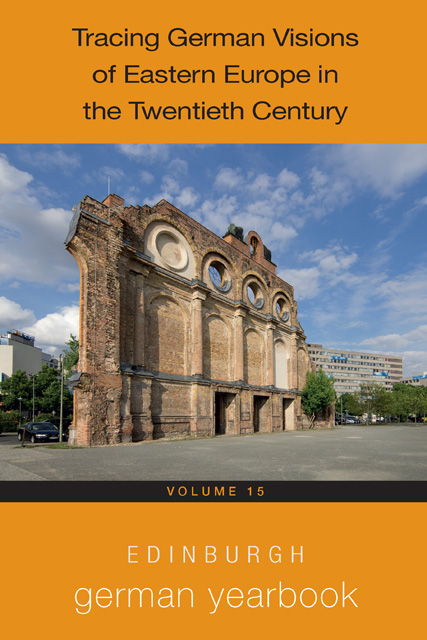Book contents
- Frontmatter
- Contents
- Miscellaneous Frontmatter
- Between Estrangement and Entanglement: An Introduction to German Visions of Eastern Europe in the Twentieth (and Twenty-First) Century
- Colonizing a Central European City: Transnational Perspectives on Kronstadt/Braşov/Brassó in the First Half of the Twentieth Century
- Exile as a Literary-Political Mission: Leo Katz’s Antifascist Bukovina Novel Totenjäger (1944)
- Brunnenland: The Image of the Bukovina in Paul Celan
- “Auch bei uns im fernen Transsilvanien”: The Transylvanian Saxons and the Long Shadow of the Third Reich in the Work of Bettina Schuller
- Through an Orientalist Lens: Colonial Renderings of Poland in German Cinema after 1989
- The Nazi Ghost and the Sinti Woman in Kerstin Hensel’s Bell Vedere (1982)
- The Haunted Landscape of Babi Yar: Memory, Language, and the Exploration of Holocaust Spaces in Katja Petrowskaja’s Vielleicht Esther (2014)
- “dann hüpfe ich auch, komisch und ungeschickt, wie eine Nadel auf einer abgespielten Platte …”: Translational Ethics and Affects in Katja Petrowskaja’s Vielleicht Esther (2014)
- Expanding the Nationalgeschichte: Multidirectional European Memory in Nino Haratischwili and Saša Stanišić
- Reading Photographic Images and Identifying Mnemonic Threads of the Post-Memorial Project in Sie kam aus Mariupol (2017) by Natascha Wodin
- Navid Kermani’s Entlang den Gräben (2018) and Its Readers: Remapping Europe’s East
- Notes on the Contributors
Expanding the Nationalgeschichte: Multidirectional European Memory in Nino Haratischwili and Saša Stanišić
Published online by Cambridge University Press: 11 January 2023
- Frontmatter
- Contents
- Miscellaneous Frontmatter
- Between Estrangement and Entanglement: An Introduction to German Visions of Eastern Europe in the Twentieth (and Twenty-First) Century
- Colonizing a Central European City: Transnational Perspectives on Kronstadt/Braşov/Brassó in the First Half of the Twentieth Century
- Exile as a Literary-Political Mission: Leo Katz’s Antifascist Bukovina Novel Totenjäger (1944)
- Brunnenland: The Image of the Bukovina in Paul Celan
- “Auch bei uns im fernen Transsilvanien”: The Transylvanian Saxons and the Long Shadow of the Third Reich in the Work of Bettina Schuller
- Through an Orientalist Lens: Colonial Renderings of Poland in German Cinema after 1989
- The Nazi Ghost and the Sinti Woman in Kerstin Hensel’s Bell Vedere (1982)
- The Haunted Landscape of Babi Yar: Memory, Language, and the Exploration of Holocaust Spaces in Katja Petrowskaja’s Vielleicht Esther (2014)
- “dann hüpfe ich auch, komisch und ungeschickt, wie eine Nadel auf einer abgespielten Platte …”: Translational Ethics and Affects in Katja Petrowskaja’s Vielleicht Esther (2014)
- Expanding the Nationalgeschichte: Multidirectional European Memory in Nino Haratischwili and Saša Stanišić
- Reading Photographic Images and Identifying Mnemonic Threads of the Post-Memorial Project in Sie kam aus Mariupol (2017) by Natascha Wodin
- Navid Kermani’s Entlang den Gräben (2018) and Its Readers: Remapping Europe’s East
- Notes on the Contributors
Summary
On the web portal dichterlesen.net, the authors Marica Bodrožić and Deniz Utlu curated the collection “Unterhaltungen deutscher Eingewanderten” (Conversations of German Immigrants). This “audiovisueller Parcours” (audiovisual parcourse), as the digital sound archive is described on the website, creates and presents a network of audio clips from historical and contemporary event recordings. The title of the collection, itself a reference to Goethe’s Unterhaltungen deutscher Ausgewanderten (1795, Conversations of German Emigrants), highlights Bodrožić and Utlu’s focus on exchange and situates writers who (or whose family) have migrated to Germany explicitly as German authors. Utlu names one of his own subsections “Die Nichtexistenz einer Migrationsliteratur” (The Non-existence of a Migration Literature) and argues that “Migrationsliteratur ist eine Perspektive auf Literatur, die nicht am Text ansetzt, sondern an einer Vorstellung von Gesellschaft” (Migration literature is a perspective on literature that does not depart from the text, but from an idea of society). His explication of “migration literature” as a classification that is placed on a text rather than originating in the text itself draws attention to the significant weight biography has been assigned when discussing texts written by authors who have migrated to Germany. Utlu instead calls for a reconceptualization, or rather elimination, of so-called “migrant literature” and its status as outside of or as supplement to the corresponding national literature.
Acknowledging Utlu’s avowal of the “Nichtexistenz” of a migration literature, this article therefore argues for the inclusion of such contemporary German-language texts and the memories in them as thoroughly German by examining Bodrožić and Utlu’s dichterlesen.net archive as well as novels by Nino Haratischwili and Saša Stanišić. Both authors, like Utlu, reject categorizations of their work as “migration literature,” with Haratischwili asserting that “eine gute Literatur hat keine Nationalität—Punkt. Kunst ist obdachlos” (Good literature has no nationality—period. Art is homeless). Stanišić, on the other hand, adheres to some understanding of a national literature, but insists that to “speak of a single ‘immigrant literature’ is simply wrong, because it is wrongly simple.” He specifically argues that “immigrant literatures are not an isle in the sea of national literature, but a component, both in the depths, where the archaic squids of tradition live, and on the surface, where pop-cultural waves hit the shore.”
In terms of authors in whose biography migration plays a role, this issue is oftentimes connected to memory.
- Type
- Chapter
- Information
- Edinburgh German Yearbook 15Tracing German Visions of Eastern Europe in the Twentieth Century, pp. 224 - 241Publisher: Boydell & BrewerPrint publication year: 2022



